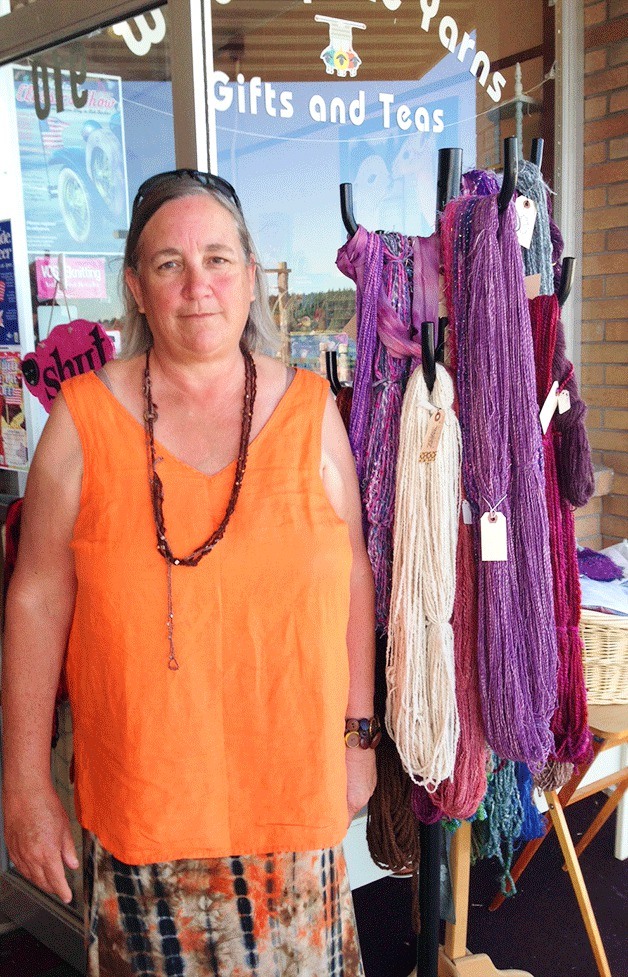An Oak Harbor woman is fighting to continue living in the back of her Pioneer Way business.
City of Oak Harbor officials maintain that Dena Royal, owner of Whidbey Island Yarns, cannot live in the back of her business because it’s against the city’s building code.
Royal said that her “studio” apartment is similar to others in the commercial district and that the city is retaliating because of her many complaints about a lack of police enforcement.
Royal received a citation Tuesday from David Anderson, who works for the city’s code compliance office.
The small room that Royal uses for a bedroom is designated as “storage” and “therefore sleeping at this facility is prohibited,” Anderson said in a letter to Royal.
Anderson delivered the letter in person, Royal said, adding that she considered it “harassment at my place of business … I had to tell him two times to leave my business.”
Royal said she immediately emailed members of the Oak Harbor City Council.
In response, Royal said, Oak Harbor Police Chief Ed Green filed a “retaliatory complaint” against Royal stating that “contacting city council members places undesired pressure on him.”
“I’m disappointed that the city of Oak Harbor uses strong arm tactics against whistleblowers,” Royal said in her letter to council members.
Green declined to comment, deferring instead to Oak Harbor City Administrator Larry Cort.
The city is “looking into” Royal’s allegations against both Anderson and Green, Cort said, adding neither of them can comment.
Royal has filed multiple complaints with the city about people smoking near her business’ doorway, cigarette butts and littering, public urination, overserving at area bars and lack of police enforcement, according to Royal as well as documents obtained through an open records request.
Cort said he is aware of the complaints made by Royal and others about graffiti, littering and other problems downtown.
“There are some concerns that we are trying to address at all levels,” he said.
Royal said she initially started living in her store on weekends to “keep an eye on things,” but moved into the space full-time a few months ago.
Because she suffers from an autoimmune disease, Royal said eliminating her commute and simplifying her life was helpful.
Royal said she didn’t believe she was breaking city rules and “didn’t make it a big deal” about living at her business because of safety concerns.
Royal’s current living space is simply not compliant with the city’s code, Cort said.
“We went through our enforcement procedure and formalized the verbal conversation we had had with her with the letter,” Cort said.
Cort said Royal may have options if she’s willing to put the money into bringing the space up to code. However, the onus lies on Royal to determine exactly what improvements must be made.
“We don’t know about that building,” Cort said. “It’s difficult to say this is exactly what you have to do.”
Meanwhile, Cort said Royal has two weeks to cease living in her business.
Tuesday’s letter marks the city’s first step in getting voluntary compliance. If Royal fails to comply, the city will initiate steps that can ultimately lead to substantial fines, Cort said.
Councilman Joel Servatius said he visited Royal’s store Tuesday after receiving her email.
Servatius told Royal his goal is to find “a fair and equitable standard for all the businesses” along Pioneer Way.
Royal said the city should work with her while she attempts to bring the space into compliance because she’s living the kind of sustainable lifestyle that the city champions.
“I enjoy lowering my carbon footprint by not having a daily commute, recycling materials … my shop/housing combined only uses the smallest city-issued trash can and often I only put that out every other week,” Royal said.
“I enjoy being able to engage in my passion of spinning yarn from local farms and doing custom yarn and wool dye work while I’m relaxing in my studio in the evenings.
“I enjoy living simply.”



